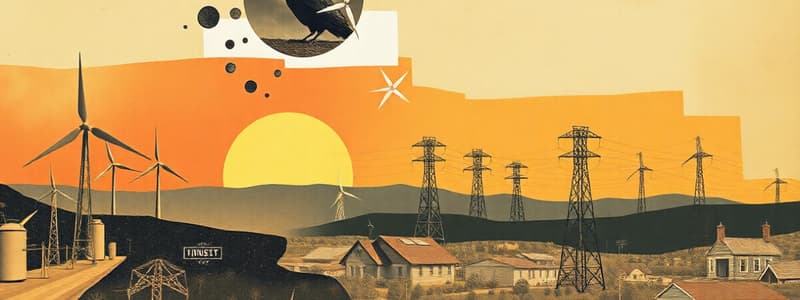Podcast
Questions and Answers
What defines energy in scientific terms?
What defines energy in scientific terms?
- The ability to do work. (correct)
- The ability to rest.
- The measure of speed.
- The total amount possessed by all objects.
Which type of energy is associated with motion?
Which type of energy is associated with motion?
- Chemical Energy
- Nuclear Energy
- Potential Energy
- Kinetic Energy (correct)
Which of the following is NOT a type of energy?
Which of the following is NOT a type of energy?
- Electromagnetic Energy
- Mechanical Energy
- Thermal Energy
- Psychological Energy (correct)
Which of the following is considered a conventional source of energy?
Which of the following is considered a conventional source of energy?
What is a key consideration when selecting methods for generating electricity?
What is a key consideration when selecting methods for generating electricity?
Which energy resource is related to the heat produced beneath the Earth's surface?
Which energy resource is related to the heat produced beneath the Earth's surface?
Which of the following types of energy is associated with the state of a body?
Which of the following types of energy is associated with the state of a body?
What is meant by the term 'energy cannot be created or destroyed'?
What is meant by the term 'energy cannot be created or destroyed'?
What is a key limitation of energy generation methods?
What is a key limitation of energy generation methods?
Which characteristic is NOT desirable for a renewable energy source?
Which characteristic is NOT desirable for a renewable energy source?
What is one of the main environmental issues associated with fossil fuels?
What is one of the main environmental issues associated with fossil fuels?
Which of the following is NOT a fossil fuel?
Which of the following is NOT a fossil fuel?
What is a common economic concern regarding fossil fuels?
What is a common economic concern regarding fossil fuels?
Which of the following best describes fossil fuels?
Which of the following best describes fossil fuels?
Which of the following is a characteristic of a successful renewable energy method?
Which of the following is a characteristic of a successful renewable energy method?
What should be a major concern for fossil fuel usage?
What should be a major concern for fossil fuel usage?
Flashcards
Perpetuity
Perpetuity
The ability of a resource to be used indefinitely. It refers to its potential to last forever without depletion.
Conversion Efficiency
Conversion Efficiency
The effectiveness of converting a given amount of energy input into useful energy output.
Reliability
Reliability
The reliability of a resource refers to its consistent availability and its ability to provide a constant output.
Cleanliness
Cleanliness
Signup and view all the flashcards
Simplicity
Simplicity
Signup and view all the flashcards
Fossil Fuels
Fossil Fuels
Signup and view all the flashcards
Disadvantages of Fossil Fuels
Disadvantages of Fossil Fuels
Signup and view all the flashcards
Energy Resource Categories
Energy Resource Categories
Signup and view all the flashcards
What is energy?
What is energy?
Signup and view all the flashcards
What is potential energy?
What is potential energy?
Signup and view all the flashcards
What is kinetic energy?
What is kinetic energy?
Signup and view all the flashcards
What is power?
What is power?
Signup and view all the flashcards
What are non-conventional energy sources?
What are non-conventional energy sources?
Signup and view all the flashcards
What are conventional energy sources?
What are conventional energy sources?
Signup and view all the flashcards
What is the initial cost of an electricity generation system?
What is the initial cost of an electricity generation system?
Signup and view all the flashcards
What is the running cost of an electricity generation system?
What is the running cost of an electricity generation system?
Signup and view all the flashcards
Study Notes
Renewable Energy Course
- Course: Elective 5 (ACE 416)
- Topic: Renewable Energy
- Year: Fourth year
- Semester: 1st Semester 2024-2025
- Coordinator: Dr. Omar Shaheen
Introduction to Energy
- Energy is the ability to do work or produce change.
- Measured in joules or kilowatt-hours (kWh).
- The total amount of energy in the universe remains constant; it cannot be created or destroyed but can be transformed from one form to another.
- No activity is possible without energy.
Types of Energy
- Potential Energy: Associated with position, state (e.g., chemical, electrical, nuclear energy).
- Kinetic Energy: Associated with motion (e.g., a moving car, a spinning wheel).
- Power: The ability to do work.
- Forms of Energy: thermal, electrical, nuclear, electromagnetic, mechanical, chemical, sound, motion, gravitational energy .
Sources for Electricity Generation
- Conventional Sources: fossil fuels (coal, petroleum, natural gas), hydraulic energy, nuclear energy.
- Non-Conventional Sources: solar energy, wind energy, tidal energy, wave energy, geothermal energy, biomass energy.
Factors in Selecting a Generation Method
- Initial Cost: Investment required for a given unit rating. Lower cost is preferable.
- Running Cost: Cost of converting resources to electrical energy; includes maintenance and repairs.
- Limitations: Availability of resources, unit size, and techno-economic viability and time-provenness of the method.
Key Desirable Features of Energy Sources
- Perpetuity: Endless duration.
- Efficiency: High conversion efficiency.
- Reliability: Consistent availability in the appropriate quantity.
- Cleanliness: Cleaner energy conversion process minimizing toxicity, pollution or hazardous side effects.
- Simplicity: Simpler overall system for easier maintenance/repair.
Fossil Fuels
- Formed by natural processes (decomposition of buried organisms) over millions of years.
- High carbon content.
- Examples: coal, oil (petroleum), natural gas, diesel.
- Disadvantages: environmental pollution (e.g. global warming, acid rain); possible depletion; fluctuating prices due to political issues and scarcity.
Energy Sources Categorization
- Fossil fuels, nuclear, renewables, and others.
- A categorization of various energy sources like coal, oil, natural gas, nuclear fission, solar, wind, geothermal, tidal, hydrogen , biomass and their associated energy types.
Studying That Suits You
Use AI to generate personalized quizzes and flashcards to suit your learning preferences.




